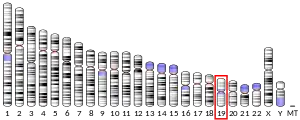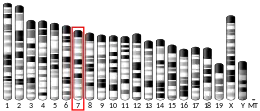SPIB
Transcription factor Spi-B is a protein that in humans is encoded by the SPIB gene.[5][6]
Function
SPI1 (MIM 165170) and SPIB are members of a subfamily of ETS (see ETS1; MIM 164720) transcription factors. ETS proteins share a conserved ETS domain that mediates specific DNA binding. SPIB and SPI1 bind to a purine-rich sequence, the PU box (5-prime-GAGGAA-3-prime).[supplied by OMIM][6]
References
- GRCh38: Ensembl release 89: ENSG00000269404 - Ensembl, May 2017
- GRCm38: Ensembl release 89: ENSMUSG00000008193 - Ensembl, May 2017
- "Human PubMed Reference:". National Center for Biotechnology Information, U.S. National Library of Medicine.
- "Mouse PubMed Reference:". National Center for Biotechnology Information, U.S. National Library of Medicine.
- Ray D, Bosselut R, Ghysdael J, Mattei MG, Tavitian A, Moreau-Gachelin F (October 1992). "Characterization of Spi-B, a transcription factor related to the putative oncoprotein Spi-1/PU.1". Molecular and Cellular Biology. 12 (10): 4297–304. doi:10.1128/mcb.12.10.4297. PMC 360353. PMID 1406622.
- "Entrez Gene: SPIB Spi-B transcription factor (Spi-1/PU.1 related)".
- Mao C, Ray-Gallet D, Tavitian A, Moreau-Gachelin F (February 1996). "Differential phosphorylations of Spi-B and Spi-1 transcription factors". Oncogene. 12 (4): 863–73. PMID 8632909.
Further reading
- Maruyama K, Sugano S (January 1994). "Oligo-capping: a simple method to replace the cap structure of eukaryotic mRNAs with oligoribonucleotides". Gene. 138 (1–2): 171–4. doi:10.1016/0378-1119(94)90802-8. PMID 8125298.
- Mao C, Ray-Gallet D, Tavitian A, Moreau-Gachelin F (February 1996). "Differential phosphorylations of Spi-B and Spi-1 transcription factors". Oncogene. 12 (4): 863–73. PMID 8632909.
- Ray-Gallet D, Tavitian A, Moreau-Gachelin F (June 1996). "An alternatively spliced isoform of the Spi-B transcription factor". Biochemical and Biophysical Research Communications. 223 (2): 257–63. doi:10.1006/bbrc.1996.0881. PMID 8670269.
- Suzuki Y, Yoshitomo-Nakagawa K, Maruyama K, Suyama A, Sugano S (October 1997). "Construction and characterization of a full length-enriched and a 5'-end-enriched cDNA library". Gene. 200 (1–2): 149–56. doi:10.1016/S0378-1119(97)00411-3. PMID 9373149.
- Rao S, Matsumura A, Yoon J, Simon MC (April 1999). "SPI-B activates transcription via a unique proline, serine, and threonine domain and exhibits DNA binding affinity differences from PU.1". The Journal of Biological Chemistry. 274 (16): 11115–24. doi:10.1074/jbc.274.16.11115. PMID 10196196.
- Nagy M, Chapuis B, Matthes T (February 2002). "Expression of transcription factors Pu.1, Spi-B, Blimp-1, BSAP and oct-2 in normal human plasma cells and in multiple myeloma cells". British Journal of Haematology. 116 (2): 429–35. doi:10.1046/j.1365-2141.2002.03271.x. PMID 11841448. S2CID 22132659.
- Yamamoto H, Kihara-Negishi F, Yamada T, Suzuki M, Nakano T, Oikawa T (February 2002). "Interaction between the hematopoietic Ets transcription factor Spi-B and the coactivator CREB-binding protein associated with negative cross-talk with c-Myb". Cell Growth & Differentiation. 13 (2): 69–75. PMID 11864910.
- Schotte R, Rissoan MC, Bendriss-Vermare N, Bridon JM, Duhen T, Weijer K, Brière F, Spits H (February 2003). "The transcription factor Spi-B is expressed in plasmacytoid DC precursors and inhibits T-, B-, and NK-cell development". Blood. 101 (3): 1015–23. doi:10.1182/blood-2002-02-0438. PMID 12393575.
- Schotte R, Nagasawa M, Weijer K, Spits H, Blom B (December 2004). "The ETS transcription factor Spi-B is required for human plasmacytoid dendritic cell development" (PDF). The Journal of Experimental Medicine. 200 (11): 1503–9. doi:10.1084/jem.20041231. PMC 2211952. PMID 15583020.
- Rual JF, Venkatesan K, Hao T, Hirozane-Kishikawa T, Dricot A, Li N, Berriz GF, Gibbons FD, Dreze M, Ayivi-Guedehoussou N, Klitgord N, Simon C, Boxem M, Milstein S, Rosenberg J, Goldberg DS, Zhang LV, Wong SL, Franklin G, Li S, Albala JS, Lim J, Fraughton C, Llamosas E, Cevik S, Bex C, Lamesch P, Sikorski RS, Vandenhaute J, Zoghbi HY, Smolyar A, Bosak S, Sequerra R, Doucette-Stamm L, Cusick ME, Hill DE, Roth FP, Vidal M (October 2005). "Towards a proteome-scale map of the human protein-protein interaction network". Nature. 437 (7062): 1173–8. doi:10.1038/nature04209. PMID 16189514. S2CID 4427026.
- Geng CD, Vedeckis WV (December 2005). "c-Myb and members of the c-Ets family of transcription factors act as molecular switches to mediate opposite steroid regulation of the human glucocorticoid receptor 1A promoter". The Journal of Biological Chemistry. 280 (52): 43264–71. doi:10.1074/jbc.M508245200. PMID 16263717.
- Dontje W, Schotte R, Cupedo T, Nagasawa M, Scheeren F, Gimeno R, Spits H, Blom B (March 2006). "Delta-like1-induced Notch1 signaling regulates the human plasmacytoid dendritic cell versus T-cell lineage decision through control of GATA-3 and Spi-B". Blood. 107 (6): 2446–52. doi:10.1182/blood-2005-05-2090. PMID 16317090.
External links
- SPIB+protein,+human at the US National Library of Medicine Medical Subject Headings (MeSH)
This article incorporates text from the United States National Library of Medicine, which is in the public domain.
This article is issued from Wikipedia. The text is licensed under Creative Commons - Attribution - Sharealike. Additional terms may apply for the media files.




